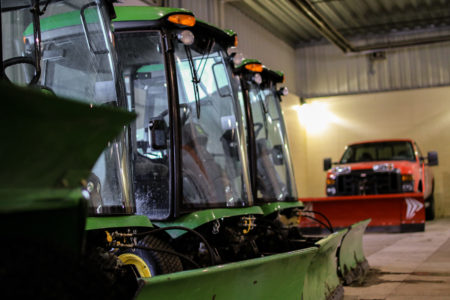By Emily Barber
barberem@grinnell.edu
Five days a week, at 2:45 in the morning, Brad Marlatt’s alarm sounds. It’s time for him to get ready for the day. He clocks in to work at 4 a.m. Marlatt, a custodian for the JRC and Younker pit, has worked for the College’s Facilities Management Department (FM) for 15 years.
According to FM’s department page on the College’s website, FM’s mission is “to provide and maintain physical facilities which meet the current and future needs of the Grinnell College community, in support of the overall mission of the college.” FM’s three sub-departments — custodial, grounds crew, and skilled trade — focus on different aspects of maintaining the campus.
According to Marlatt, for custodians, the job entails “anything that involves cleaning.” While school is in session, Marlatt works in the JRC for the first four hours of his shift, and then, after a short break, cleans Younker pit. During the summer, FM focuses on upkeep projects like floor waxing, wall and window washing and cleaning and replacing light fixtures. Marlatt says alumni week is one of his busiest times. Custodians have to get the dorms ready for alumni right after students move out. Move-out often leaves big messes and the fast turnaround, Marlatt said, sometimes feels like running a motel.
Marlatt said he feels sufficiently compensated for his hard work, in large part thanks to wage contracts negotiated by FM’s labor union. Union representatives from International Brotherhood of Teamsters, a national labor union with a chapter in Des Moines, negotiate FM wage contracts with the College every three years. According to Marlatt, Teamsters traditionally negotiates for cost of living increases each year in the form of yearly percentage increases on FM workers’ hourly wages. Usually, the increase is around two to three percent per year.
Marlatt is thankful for the union: without it, he said, he’d be “working for a lot less and benefits wouldn’t be quite as good.” Marlatt asserted that, because of their union, FM workers have substantially higher hourly wages than other on-campus employees.
Furthermore, representatives from Teamsters represent FM workers if they have issues with management or if a conflict arises. Technically, Marlatt said, FM workers “don’t even have to address management” unless they have union representation with them.
Teamsters’ relationship with the College has historically been a good one. FM has had a union for as long as Marlatt has worked for the College, and Marlatt said the College generally has “negotiated in good faith” with FM. However, “sometimes you get what you want, and sometimes you don’t,” he said.
Marlatt said FM’s last wage contract with the College was good, with “pretty good raises.” However, in the past, the College has refused to give cost of living increases and has instead given FM workers stipends.
“Stipends aren’t good,” Marlatt said. Ideally, he said, workers would get an increase on their hourly wage instead of a lump sum stipend for the year.
Aside from the lucrative pay and regular percentage increases, Marlatt finds meaning in his job through the relationships he gets to build with students. Marlatt said he has driven students to the airport before, and he likes to try to get to know the names of students he sees regularly. He remembered an instance where a student was surprised that Marlatt knew his name. “Sure I know your name,” Marlatt said. “I do this job because I love getting to know the students. It’s what makes it worth it.”



























































